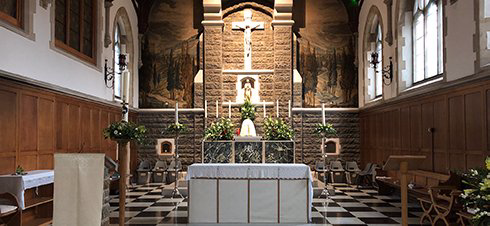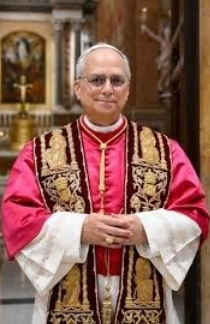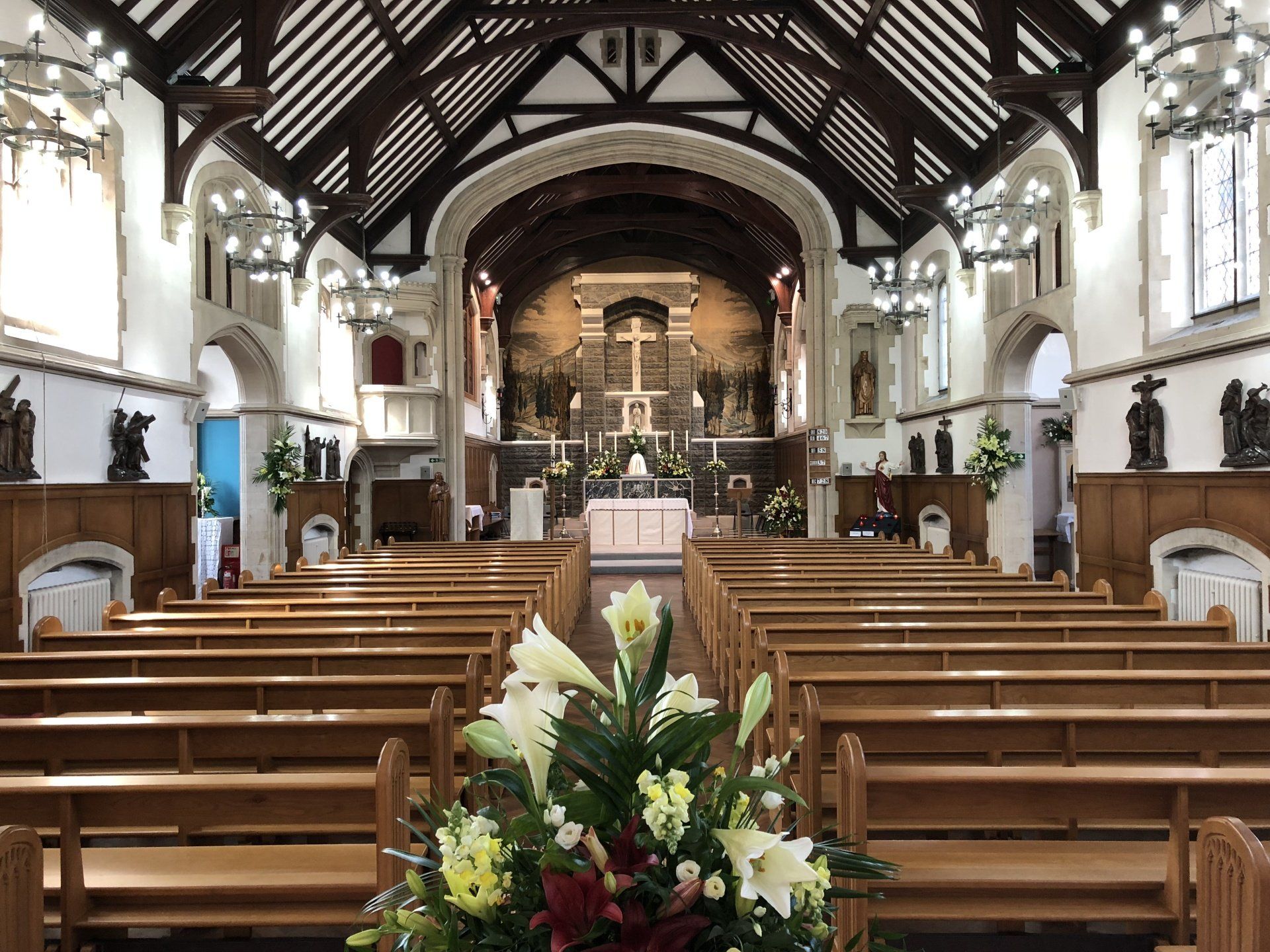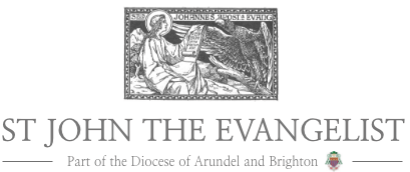St John's School Vacancy
Webmaster • April 26, 2021
St John’s school are advertising for a Headteacher and enquiries should be directed to HRSchoolAdverts@westsussex.gov.uk or the diocesan website or the school‘s website for further information. The closing date for applications is 30th April.

This Sunday's Gospel tells the story of the call of Simon Peter and Andrew, the fishermen, to leave their nets behind on the sea-shore and to follow the Lord. In that moment, they are given a new vocation. It would have been impossible at that moment to say what their time with Jesus would entail: walking with the Word Incarnate, experiencing His loving power to heal the world, witnessing His fulfillment of the prophecies, sacrificing Himself for mankind.... Nor can they have imagined to what end it would lead them: becoming, along with the other apostles, the foundation stones of the New Israel, the Church, abandoning Christ in His hour of need; being restored to His friendship and forgiveness at Easter when He appeared to them Risen in the flesh; receiving His Spirit poured out on them at Pentecost; preaching Him and celebrating His sacraments as leaders of the churches of Rome and Constantinople, converting both Jews and Gentiles, and finally experiencing a death like His, both crucified like their Master. We do not know what wonderful graces we will receive nor the trials we will suffer when we follow Jesus: all we can do is leave our nets and go after Him! With this in mind, we pray especially this week for Archbishop-elect Richard Moth, who will celebrate his final Mass at our Cathedral this Friday. We pray that having served us here in Arundel & Brighton, he will be filled with great courage and zeal to follow the Lord to new pastures in the Archdiocese of Westminster. For him, it wil surely be a moment needing great humility and strength from the Lord as he faces a new mission, not knowing what it might entail. We give thanks for his faithful ministry to us here in our diocese, and pray that the Lord will give him peace and joy and he continues to follow Him, and lead His flock in a new way. And we pray, too, for a new shepherd to be appointed soon to lead us. "Let us pray. O God, shepherd and ruler of all the faithful, look favourably on your servant whom you will set at the head of your Church of Westminster as her shepherd; grant, we pray, that by word and example, he may be of service to those over whom he presides, so that, together with the flock entrusted to his care, he may come to eternal life. Through Christ our

We invite you to join Horsham Churches Together for the 2026 Week of Prayer for Christian Unity, from 18th to 25th January 2026. This year, we are guided by the ancient, prayerful traditions of the Armenian Church and St. Paul’s timeless call to be ‘one body and one Spirit’ in Ephesians 4. There will be daily prayer meetings and a United Service at St Mary’s, The Causeway, Horsham RH12 1HE at 6pm on Sunday 25th January 2026 – this will be led by Fr Tristan and he would love to see as many St John’s parishioners there as possible! Other events taking place during the week are as follows: Sunday 18th Jan, 6:30pm – Prayer Meeting at Horsham United Reform Church, RH12 2RG. Monday 19th Jan, 1pm – Prayer Meeting with Horsham Eco Church @ St Marks, Holbrook, RH12 5PU. Tuesday 20th Jan, 7:30pm – Prayer Meeting at Cornerstone Methodist Church St Andrew’s, Roffey, RH12 4DX. Wednesday 21st Jan, 7:30pm – Turn the Battle Encounter Night at Kingdom Faith Church, Horsham, RH13 5PX. Thursday 22nd Jan, 7:30pm – Prayer Meeting at Brighton Road Baptist Church, Horsham, RH13 5BD. Friday 23rd Jan, 1:30pm – Prayer Meeting at Trafalgar Road Baptist Church, Horsham, RH12 2QL. Saturday 24th Jan, 10am – Prayer Meeting at St Margaret’s Church, Warnham, RH12 3QW.

Demonstrations against the Iranian regime, which have spread to many of the country’s provinces, have been violently suppressed by security forces in Iran, with widespread fighting in Syria between the army and Kurdish forces in the northern city of Aleppo. “I pray for those who are suffering," he said, "and I renew my call for an end to violence and for intensified efforts to achieve peace." On Monday, the Pope met Venezuelan Nobel Prize winner, politician, and activist, Maria Corina Machado, at the Vatican's Apostolic Palace. The meeting took place about 10 days after the capture of the Venezuelan president, Nicolás Maduro, and his wife Cilia Flores during a United States military operation in the Venezuelan capital, Caracas. Speaking during his Angelus address the day after Maduro’s capture (during which about 80 people, including civilians, were killed) Pope Leo said he was following developments in Venezuela “with deep concern” and called for the respect of “the human and civil rights of each and every person.” The Pope reiterated his appeal during the 9 January meeting with the diplomatic corps accredited to the Holy See. Referring to Venezuela, he urged efforts to build “a society founded on justice, truth, freedom and fraternity, and thus enable the nation to rise from the grave crisis that has afflicted it for so many years.” He also invited all parties to “respect the will of the Venezuelan people, and to safeguard the human and civil rights of all, ensuring a future of stability and concord.”

With the feast of the Baptism of the Lord, another major milestone is reached in what we might call the 'Christmas half' of the Liturgical Year. Centuries ago, this feast used to be one celebration commemorating three events in the Lord's life: the coming of the three Magi, the Baptism, and the miracle at Cana, and there are traces of this fact even in the liturgy of today. Jesus's Baptism in the Jordan is an important moment in His earthly life, because it again is a moment where His true identity as both man and God is 'manifested': that is, displayed to the peoples of the world. The Father's voice is heard proclaiming Him to be the Son, the Beloved, and through faith, as He rises from the water, we come to believe, just as the Magi believed when they saw him manifested to the world in the manger. The light of faith, which thanks to Jesus's baptism, is also conveyed to us through sacramental washing with water, is greater than the light of the Epiphany star that shone so brightly all those years ago in Bethlehem. It inspires us from within, and shines not in one particular place, but everywhere the Church is present; it shines with the light of the Holy Spirit Himself who comes from the Father, and from the Son, teaching us not only who Jesus is, but how to manifest Him to others. Through this light which changes the direction of our lives, illuminates our conscience, and beautifies our actions, Christ is made visible here. Thus, when we are faithful to the promises of our baptism, we somehow show people the presence and reality of Jesus, God-with-us, and teach the true meaning of Christmas.

A SAVIOUR IS BORN TO US - CHRIST THE LORD! As Advent draws to a close, we hear how St Joseph welcomed the news of the birth of the Saviour and accepted, with courage and faith, to take Mary for his wife, to look after her and her precious burden. Into his heart, Joseph - Guardian of the Blessed Virgin and Patron of the Church - picks up and carries the mystery of the Word, and ponders its weight. The message he received is also our responsibility - as fathers, mothers, men and women of faith. We have a role to play in the ongoing Christmas story - to rejoice and embody the joy of receiving a Saviour. We naturally feel joy in human things in this season: gathering with family and friends, to be off work for a little. But the truth of "Christmas spirit" is more profound: a deep and awe-inspiring truth we realise when we gather around the Holy Family in the manger. In the stable of Bethlehem, we see the Word become man ('Emmanuel', God-with-us). Thanks to that same event, we are to become like God, in receiving eternal life. God became part of our human family, and we become part of His Son's Body. Jesus' Advent raises our human nature to an incredible dignity, and with it, a great responsibility: to reject the bad that drags us down, and live with sacrificial love, like His Son. St Leo the Great summed up this mystery like this: "Dearly beloved, today our Saviour is born; let us rejoice… When the angels on high are so exultant at this marvellous work of God’s goodness, what joy should it not bring to the lowly hearts of men? […] Christian, remember your dignity, and now that you share in God’s own nature, do not return by sin to your former base condition. Bear in mind who is your head and of whose body you are a member. Do not forget that you have been rescued from the power of darkness and brought into the light of God’s kingdom. Through the sacrament of baptism you have become a temple of the Holy Spirit. Do not drive away so great a guest by evil conduct and become again a slave to the devil, for your liberty was bought by the blood of Christ." May I take this opportunity, along with Deacon Tom, to offer you all our prayers for a very wonderful celebration of the Christmas mysteries here at St John the Evangelist, and a very blessed New Year to you all!

'Bid the Lord welcome!' Our theme of "Welcome" for this Advent emerges once again in the readings and texts of this Sunday, which is called 'Gaudete Sunday' after the Latin word that begins the Mass's Introit meaning "Rejoice!" After the challenging words of Jesus and St John the Baptist in the first two weeks of Advent, admonishing us to be ready for the Second Coming, in this week that theme continues, but with a new tone or shade shining through: a lightness, a joy, and to signify this the vestments of the Mass change colour on this Sunday from solemn purple to a lighter rose. The readings focus on the signs that accompany the arrival of the Messiah: the blind see, the lame walk, the dead are raised up… The justice of God is to be done! And that in itself, as much as it challenges us, also is a cause for great joy: salvation is at hand for sinners, and Death is to be no more! Joy is an essential effect of the spirit of welcome. When we no longer resist Christ, who knocks at the heart's door and waits for us patiently to open it, anguish is extinguished, and joy begins to suffuse us. The strange thing about this is that this takes place even in the darkness, in painful experience. And when we welcome others, we experience God's welcoming joy in us AND spread it to others in the very same moment. A parish community where people make a genuine effort to love one another - smile, greet, pray, assist one another - is an extraordinary place, and a place of evangelisation that others want to be part of. St James reminds us of this today: "Do not grumble against one another, brothers and sisters… behold, the Judge is standing at the door." (Jas 5:9) This joy to each other does not always come naturally, but what a difference it makes. The Benedictine spiritual writer Dom Prosper Guéranger noted that joy may require a victory over self, writing that we must: 'make an effort to be cheerful […] Cheerfulness takes courage, as does everything else; and it is for God that we must overcome ourselves in this way. Rejoice in the Lord always, again I will say Rejoice…! We must pull the ground out from under the feet of that melancholy that is no good for either this world or the next.' One very good reason to be joyful in this season is that we welcome among us Barnabas Mercer, a fourth-year seminarian for our diocese who will be spending the next 6 months with us as part of his formation for the priesthood. It is an amazing joy to see God calling young men into His service and to the service of His people. Please pray for him, welcome him - and pray for the others who will one day follow the same path, if it be God's will. Some of them are here in Horsham too!

ADVENT IS HERE! • Candlelit 'RORATE' MASSES will take place on the first three TUESDAYS of ADVENT starting 2nd December at 7am. Please note the earlier start time . The Mass will take no more than 30 minutes and be followed by breakfast served in Hall, so people have time to get to school and work afterwards. All are welcome to join us for this beautiful way to mark the Advent season. • ADVENT RECONCILIATION - Advent is a good time to celebrate the Sacrament of Reconciliation, so that, as He cleanses from the sin with which we all too often reject Him, we can welcome Him anew to be born into our hearts at Christmas, just as Mary, Joseph and the shepherds welcomed His birth into the world. Canon Tim Madeley will be hearing Confessions here on Saturday 13th December from 10.30am . Additional Advent times in our soon-to-be parish communities are: - HENFIELD – Monday, 8th December at 7.00pm (Fr Hugh) - WEST GRINSTEAD – Friday, 12th December at 7.00pm (Canon Tim & Fr Tristan) - BILLINGSHURST – Saturday, 13th December at 10.00am (Fr Tristan) - CRAWLEY – Friday, 19th December at 6.00pm (Fr Nelson, Fr Anthony, Fr Peter, Fr Joachim, Fr Tristan) - CRAWLEY – Saturday, 20th December at 10.30am (Fr Nelson, Fr Anthony, Fr Peter, Fr Joachim) - WORTH ABBEY – Monday, 22nd December at 7.30pm (Priests of the Benedictine community) • FAMILY COME AND SING CAROLS - As we journey through Advent and prepare our hearts for the coming of Christ at Christmas, we warmly invite you to our Family Come and Sing Carols event on Sunday 7th December at 3pm in the Parish Hall. Gather around the piano to sing favourite carols, with Advent-themed crafts for the children. We’d love it if you could bring a little something festive—like mince pies, cake, or mulled wine—to share. If you play an instrument, you’re welcome to bring it along and join in the music-making. Let us come together as a parish community in joyful anticipation of Christmas. • ‘GAUDETE’ SUNDAY, 14TH DECEMBER – Please remember to bring your crib figures and Nativity sets to Mass on the weekend of 13th and 14th December, when they will be blessed at the end of all Masses. You will also be able to pick up some blessed straw on your way out of Church, for placing in your home Nativity scenes.

Welcome to Advent! We welcome the Coming of Christ in Advent - and in our Eucharistic Forum, our thoughts will turn to how we can welcome one another to our church. Please sign up to take part, and pray for a greater welcome in our church, particularly for those who will be joining us at Christmas - that they may see Christ in us, His people. "Drop down dew, you heavens, from above, and let the clouds rain down the Just One!" (Isaiah 48:5) These words are heavily associated with the wonderful season we are now entering. The Latin word rorate (meaning "drop dew!") gives its name to a special kind of Mass we will be celebrating on Tuesdays at 7am here at St John the Evangelist during Advent. Popular in many countries (including Poland and the Philippines), the Rorate Mass is a celebration of a Mass honouring Our Lady that takes place close to dawn. Farmers would come with their families before setting out for the fields, or returning from milking, the church in darkness except for the many candles burning about the place and in the people's hands. The peaceful Mass evokes the light of Christ gently entering the darkness of the world, in the womb of Mary, before His revealing at Christmas. Furthermore, as at Mass on most occasions, both priest and people would turn eastwards together, facing the direction of the rising sun and mirroring the words of the Scripture "Look toward the east, O Jerusalem, and see the joy that is coming to you from God!" (Baruch 4:36) Jesus is described in many places as the Oriens, or 'Rising One' (cf Zach 6:12; Lk 1:78), or 'Sun of Justice' (cf Mal 4:2). His Advent is the coming of Day against the long Night of of God's people waiting for salvation. All of us, in our human condition, cry out in the darkness for His truth, justice and peace, and thus we pray for Him to come soon. Christ welcomes you too. Come to a Rorate Mass and experience this beautiful and peaceful way to begin your own Advent day, holding the candle you will be given, or, as I have seen European children do, bringing a coloured lantern. We will all pray together to the Father to 'rain down' His grace into our lives, as His Son, who came and will come again, already bursts into the world.

CAR PARKING RENEWALS Car parking Renewals for 2025-2026 are now due. This year’s parking subscriptions for 1st Nov 2025 – 31st October 2026 are: £135 Short Term Carpark – 3 Hours; £405 Long Term Carpark – All day. Renewals can be made using the following link https://www.stjohnshorsham.com/car-parking . We would encourage those that do not have access to the internet to get family or close friends to help with the renewals, as the Parish Office is not involved in this process. Once we have an idea of the number of renewals, any registered parishioner who is interested in obtaining a fob, may be put onto a waiting list, which will be held by the parish office.

ADVENT IS NEARLY HERE! • Candlelit 'RORATE' MASSES will take place on the first three TUESDAYS of ADVENT starting 2nd December at 7am. Please note the earlier start time . The Mass will take no more than 30 minutes and be followed by breakfast served in Hall, so people have time to get to school and work afterwards. All are welcome to join us for this beautiful way to mark the Advent season. • ADVENT RECONCILIATION - Advent is a good time to celebrate the Sacrament of Reconciliation, so that, as He cleanses from the sin with which we all too often reject Him, we can welcome Him anew to be born into our hearts at Christmas, just as Mary, Joseph and the shepherds welcomed His birth into the world. Canon Tim Madeley will be hearing Confessions here on Saturday 13th December from 10.30am . Additional Advent times in our soon-to-be parish communities are: - HENFIELD – Monday, 8th December at 7.00pm (Fr Hugh) - WEST GRINSTEAD – Friday, 12th December at 7.00pm (Canon Tim & Fr Tristan) - BILLINGSHURST – Saturday, 13th December at 10.00am (Fr Tristan) - CRAWLEY – Friday, 19th December at 6.00pm (Fr Nelson, Fr Anthony, Fr Peter, Fr Joachim, Fr Tristan) - CRAWLEY – Saturday, 20th December at 10.30am (Fr Nelson, Fr Anthony, Fr Peter, Fr Joachim) - WORTH ABBEY – Monday, 22nd December at 7.30pm (Priests of the Benedictine community) • FAMILY COME AND SING CAROLS - As we journey through Advent and prepare our hearts for the coming of Christ at Christmas, we warmly invite you to our Family Come and Sing Carols event on Sunday 7th December at 3pm in the Parish Hall. Gather around the piano to sing favourite carols, with Advent-themed crafts for the children. We’d love it if you could bring a little something festive—like mince pies, cake, or mulled wine—to share. If you play an instrument, you’re welcome to bring it along and join in the music-making. Let us come together as a parish community in joyful anticipation of Christmas.
